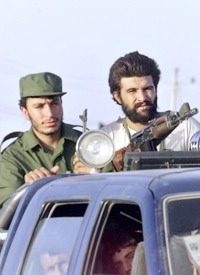
The commanding general of the Marine Corps in southern Afghanistan has a message for President Obama: We need more troops on the ground, but not ones with the Stars and Stripes on their uniforms.
Brigadier General Larry Nicholson said he appreciates the President’s efforts, but what he really needs are Afghan soldiers committed to the cause of their freedom as much as their American counterparts. “I got 10,000 Marines. I have 2,000 Afghans. I get asked all the time, ‘How many Afghans do you want?’ I want one to one. Every time one of our squads is going out, I want an Afghan squad with it,” General Nicholson told reporters from the Reuters news service.
Nicholson has a influential supporter on his side — Commander of U.S. Armed Forces in Afghanistan, General Stanley McChrystal. McChrystal expressed his goal to increase the number of Afghanis serving in the defense of their own country over the next four years, aiming for a total mission-ready native force of 400,000.
Line commanders in the area are struggling to overcome numerable obstacles in accomplishing their commanders’ objectives. Lieutenant Colonel Frank Jenior of the 82nd Airborne Division explained one of the theatre-specific problems impeding the effective training of Afghan recruits. “The biggest hurdle is trying to develop them [Afghan soldiers] while they’re in a fight everyday. The way our army trains back in the States, no one is shooting at us, so we can focus on training and developing our units. Here we’ve got to try and do that while they’re being shot at…”
As mentioned in an earlier article on the subject, perhaps the most demoralizing setback in the quest to drill and deploy Afghanis is the desertion rate among their ranks. An American officer assigned to mentor the 205th Afghan National Army Corps admitted that tribal animosity, corruption, and low pay contribute to an anemia in the Afghan forces that cannot be stanched by any amount of professional training or pay raises (the U.S. government, the source of the Afghan soldiers’ salaries, recently announced a wage increase to $165 a month).
Perhaps the most pernicious of all the impediments to adherence to the President’s timetable for transferring absolute responsibility for security and defense to native military and police forces is the fact that the fighters most prone to fleeing are those who come from and serve in southern Afghanistan, home to the bloodiest violence and the boldest Taliban resurgence. When faced with killing their countrymen or abandoning their unit, the Afghanis trained by exasperated U.S. professional military men and paid by the already overburdened U.S. taxpayers, so often choose the latter.
When reading these reports filed by U.S. officers, one can sense their genuine frustration. Regardless, they keep trying, doing their best to honor the unmatched service standards of the American fighting man. And with so many of those armed and educated by American treasure and guarded with American blood turning traitor, one wonders if we are merely sharpening the swords of students that will one day be turned on the teachers.
Photo: AP Images



